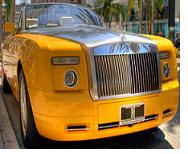Patent
Rolls-Royce must lower the $3.7bn in damages sought in a patent lawsuit
 Rolls-Royce Group Plc must lower the $3.7bn in damages sought in a patent lawsuit against United Technologies Corp.'s Pratt & Whitney because the jet- engine maker overstated the effect of competition, a judge ruled.
Rolls-Royce Group Plc must lower the $3.7bn in damages sought in a patent lawsuit against United Technologies Corp.'s Pratt & Whitney because the jet- engine maker overstated the effect of competition, a judge ruled.
Estimates for engine prices, units sold and the value of service contracts are "based on misstatements of the law, a lack of sound evidence, and unsupported economic assumptions," U.S. District judge Leonie Brinkema in Alexandria, Virginia, said in a May 4 ruling. Brinkema didn't say what the damages can be should Rolls-Royce prove during trial that Pratt used a patented design for engine fan blades without permission.
Rolls-Royce claims Pratt's GP7200 Fan Stage violates patent rights issued in 2000 for a Rolls-Royce Trent engine used on Airbus SAS A380s. London-based Rolls-Royce argued that it should be entitled to $1.35bn for the lower prices it said it was forced to charge on engines, plus $2.3bn in profit lost because of engines sold by a venture of Pratt and General Electric Co.
The list price for the Trent engine is $20m, which was discounted an average of 87.3% to $2.54m, the judge said, citing company data. She rejected Rolls-Royce arguments that without competition from East Hartford, Connecticut-based Pratt's GP7200 engine, the discount would have been 77%, for a price of $4.6m, the filing shows.
A damages consultant hired by Rolls-Royce "cannot just simply assume that airlines would happily pay millions of dollars more per engine," Brinkema wrote in throwing out the consultant's report. "It is not even clear whether Airbus would have undertaken the project of producing the Airbus 380 in the first place if it had only one engine supplier to rely upon."
"Rolls-Royce takes protection of its technology and intellectual property very seriously and will vigorously pursue legal action against any attempts to infringe it," Mia Walton, a spokeswoman for Rolls-Royce in the U.S., said in an e-mail.
Pratt told the judge it plans to install different blades on further engines that design around the Rolls-Royce invention.
As an alternative to the $3.7bn in damages, Rolls- Royce said it could instead be entitled to $1.3bn as a lump sum of royalties owed. The company based that claim on interest from the consultant's estimate that a royalty agreement with Pratt would have been signed for $493m in 2000.
Brinkema said Rolls-Royce could ask for $493m at most, and Pratt can challenge that figure because it equals almost the entire amount Pratt invested in the joint venture with GE and is "highly speculative."
Pratt in November filed its own patent-infringement case against Rolls-Royce with the U.S. International Trade Commission in Washington. A trial is scheduled for October before the agency, which has the power to block imports of products found to violate U.S. patents.
The case is Rolls-Royce Plc v. United Technologies Corp., 10cv457, U.S. District Court for the Eastern District of Virginia (Alexandria).
(Published by Bloomberg - May 10, 2011)